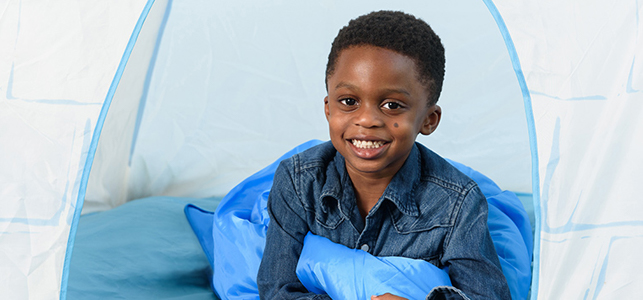
Why bedding wetting happens and how to help
The following answers were provided by Jenna Brand, urology nurse practitioner. Our urology team works with children and their families to address a wide range of issues including bedwetting, daytime wetting, voiding dysfunction and urinary infections as well as more complex and chronic urologic conditions such as hydronephrosis, vesicoureteral reflux and neurogenic bladder.
Is it common for a child to wet the bed?
Nocturnal enuresis, or bedwetting, is a common occurrence in children of all ages. In most cases, children who wet the bed are completely healthy and do not have any other urologic abnormalities. In fact, bedwetting is so common in the first few years after toilet training that it’s inaccurate to call it a condition and inappropriate to treat it medically in that age group. In surveys of healthy children, about 15 percent of 5-year-olds and 10 percent of 7-year-olds still wet their beds.

Do children wet the bed because they are too tired or lazy to get up and go to the bathroom?
There are several different theories about why children wet the bed. The exact cause of bedwetting is unknown; however, it is thought to be due to a combination of physiological, learning, behavioral and emotional factors.
There also appears to be a strong family component to bedwetting. Research has shown that if one parent has a history of bedwetting, their child has a 44 percent chance of wetting the bed as well. If both parents have a bedwetting history, the likelihood that their child will wet the bed increases to 77 percent.
Studies have also shown that some children who wet the bed may have an abnormal level of antidiuretic hormone (ADH) in their body. This hormone helps the kidneys retain water, which decreases the amount of urine stored in the bladder through the night. Low levels of ADH in the body result in increased urine production and may contribute to nighttime wetting. However, the majority of children who experience problems with wetting the bed simply never learned to stay dry at night. It’s important to remember that most children do not like that they wet their beds.
Are there any solutions or home remedies you’d suggest to parents?
Fluid restriction and waking children at night may solve the problem in some instances. Bladder retraining exercises aimed at increasing the volume of urine stored by the bladder are not recommended and can actually do more harm than good to the to the kidneys and urinary system.
The majority of children who wet the bed will outgrow the problem; in fact, children have a 15 percent chance of outgrowing their bedwetting each year. Because most children with bedwetting problems become dry without any treatment, the best things to offer young children who wet the bed are patience, understanding and support.
Does the same problem cause a child to wet the bed at night and during the day?
Some children who wet the bed also have daytime urine accidents. However, daytime wetting after the age of toilet training can be due to a different problem than bedwetting alone and it is not considered a typical part of growing up. Many factors can contribute to the persistence of daytime urine accidents and each child must be evaluated and treated on an individual basis.
Daytime wetting is most often due to a functional disorder of the bladder or bowel, but also can be caused by a physical abnormality or a neurologic problem (spina bifida, spinal cord injury, etc.). It may be beneficial for children with persistent daytime wetting to be evaluated by a specialist in order to rule out any of these conditions.
 When should parents seek professional help for a child who wets the bed?
When should parents seek professional help for a child who wets the bed?
Treatment options may be available if bedwetting persists beyond 7 years of age. Also, bedwetting at any age in association with urinary tract infections, daytime wetting, painful urination or frequent urination may indicate an underlying urologic problem.
Talk with your child’s doctor if your child is experiencing any of these symptoms. In these situations, the underlying condition may need to be treated to protect the kidneys and overall health of the urinary system. Children who experience any of these symptoms should be evaluated with a detailed history, physical exam and possibly urine testing. In some cases, an ultrasound of the kidneys or other imaging tests may be necessary.
Even though most children who wet the bed are healthy from a medical standpoint, the social costs of bedwetting begin to rise over time. Washing sheets and replacing mattresses can also get expensive and be time consuming. Children who wet the bed may feel embarrassed around their siblings or peers and be hesitant to go to sleepovers or overnight camps. If bedwetting begins to take an emotional toll on your child, it may be worthwhile to consider treatment options.
What treatment options are available for bedwetting?
There are a number of treatment options for bedwetting, however there is no single therapy that is consistently effective. Current treatment options include medications, behavioral modification, motivational therapy and positive reinforcement. Medications may temporarily help your child stay dry, but once the medication is stopped, the bedwetting is likely to return.
Behavioral modification with the use of a bedwetting alarm system is a treatment option that is more likely to cure the problem. The alarm works by training the child to either wake up at the sensation of a full bladder or hold their urine through the night. The conditioning process can take weeks or months, so it is essential that both the child and parents are motivated and prepared to work together for the duration of the treatment process. These treatment options are only effective if used properly and consistently.
Talk with your child’s doctor or specialist about which treatment option is best for your child.
